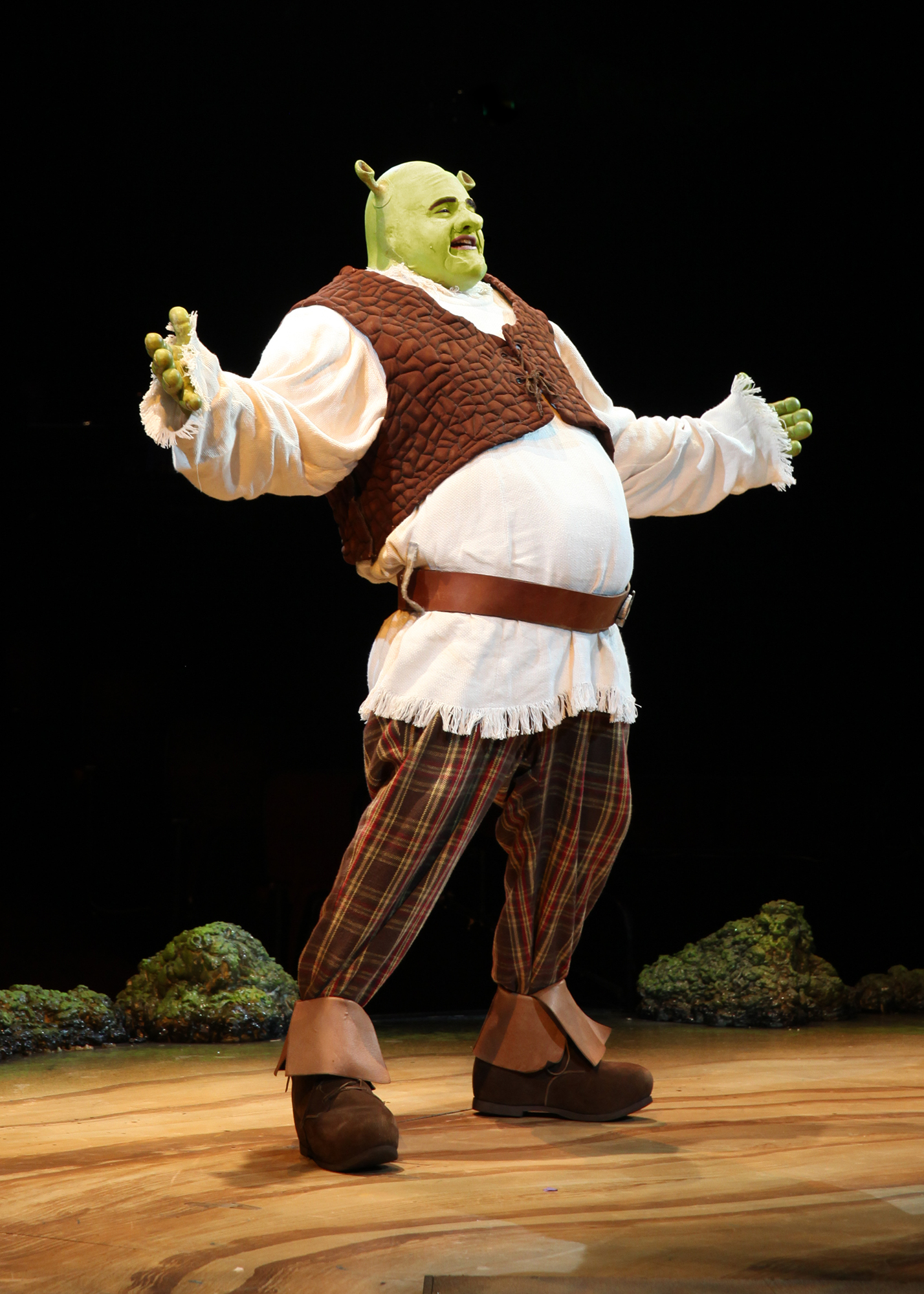July Theater Guide: Big Winners, Gripping Geezer Dramas, and More

Texture Contemporary Ballet demonstrates the art of leverage—and the company’s “Interfusion” show leverages us through the middle of a month filled with high drama, Broadway musicals, et cetera.
July is always expected to be a musical month in Pittsburgh theater and this July’s schedule fits the bill, with more musicals than you can shake a stick at, many of which you wouldn’t want to.
Damn Yankees? Damn right. The Spitfire Grill? An under-appreciated sleeper hit. And Jesus Christ Superstar? If you want to see it again, here is your chance. But along with these musicals and several more—plus a couple of intriguing dance performances, which come with music at no additional charge—the schedule includes a few eye-openers of different sorts.
Two Pulitzer Prize-winning plays are being staged: 1978’s winner The Gin Game, a seriocomedy not often performed in recent years, and the deeply moving 2009 winner Ruined. We also have an evening of short Samuel Beckett plays, led off by the seriocomically-absurdist-tragic-or-maybe-not classic Krapp’s Last Tape.
If you’re looking for plays of a similar theme, consider that Gin Game and Krapp are both geezer dramas (that is, plays about old people looking back upon lifetimes all shredded to smithereens) … and if you are looking for a Shakespeare play with a topically relevant theme for this chaotic and fractious election year, try Julius Caesar. You may find him guilty as charged.
Shows are previewed in order of their run dates.
KRAPP’S LAST TAPE and NOT I by Samuel Beckett. July 1-9, TACT.
It should make for a memorable evening when TACT, a theater company that’s new on the radar, performs two short pieces by Samuel Beckett, known on most people’s radar as the author of Waiting for Godot. The items on the TACT bill, Krapp’s Last Tape and Not I, are one-person one-acts. Krapp’s Last Tape runs about 40-odd minutes and like Godot, it is odd but accessible—easy to follow, though the meaning(s) may be elusive, and funny in a seriously absurd way. An old man listens to a tape recording of thoughts and observations that he made when much younger, then records a new tape, trying to update and correct his life’s story. Topics addressed include bananas (the actual yellow fruit) and glimmers of love. If you wanted the ideal Pittsburgh actor to play Krapp you’d think “Hmm, Martin Giles?” and you would be right. Daina Michelle Griffith plays the unnamed woman in Not I, a shorter and much stranger piece about which it is best to know nothing in advance. Suffice it to say that the Not I woman is one of the weirdest roles to perform, or to watch. At the New Hazlett Theater, 6 Allegheny Square East, North Side.
DAMN YANKEES (musical). July 5-10, Pittsburgh CLO.
Would you root for a baseball player who sold his soul to the Devil? And we’re not talking about performance-enhancing drugs, we mean a guy who makes a real deal with the Prince of Darkness for the ability to hit the long ball, as lead character Joe Hardy does in Damn Yankees, winner of the 1956 Tony Award for Best Musical. Pittsburgh CLO is staging a revival of Damn Yankees to inject some post-Fourth-of-July pop into its summer lineup. The story portrays Joe as the mysterious new star of a chronic underdog team, the Washington Senators of the 1950s. Dramatic tensions (and much humor) arise from the question: Can Joe help the Senators finally beat the damn New York Yankees for the pennant, and wiggle out of his Satanic contract? But the show is best known for its musical numbers, of which two became stand-alone hits: “You Gotta Have Heart”—the clip above is from the 1958 movie—and “Whatever Lola Wants (Lola Gets),” sung and danced by the Devil’s assistant temptress-in-chief. Damn Yankees was composed by Richard Adler and Jerry Ross, with a book by George Abbott and Douglass Wallop. How’s that for a home-run name? At Benedum Center, 237 7th St., Cultural District.
THE GIN GAME by D.L. Coburn. July 7-16, Apple Hill Playhouse.
The Gin Game is one of those potential hidden gems on the entertainment calendar—a Pulitzer Prize-winning play from decades ago, rarely produced and barely even remembered nowadays, until it pops up at a theater somewhere. Lately this comic drama about a pair of cantankerous old folks in a nursing home is enjoying a comeback. Last year The Gin Game was revived on Broadway with the esteemed geezer-legends James Earl Jones and Cicely Tyson playing the roles, and now it’s being done locally by Apple Hill Playhouse. The play’s action begins when the old guy and gal, feeling lonely and abandoned, decide to strike up a friendship over games of gin rummy. At first all goes well, as the duo engage in jovial banter while sharing reminiscences of the lives they’ve lived. But the card games turn competitive, and so does the conversation, and what unfolds is a battle over who’s got the better hand in every respect. The Gin Game, by D.L. Coburn, received the 1978 Pulitzer for Drama. At 275 Manor Rd., Delmont.
EFF.UL.GENTS (modern dance) by Elisa-Marie Alaio. July 7-16, fireWALL dance theatre.
Usually it’s just lazy journalism to preview an artistic performance by repeating the promotional copy that the company puts out. But every once in a while, you look at the material and you think, “I’m not going to try to paraphrase that.” Here is what fireWALL dance theatre has to say about its new piece, Eff.Ul.Gents: “Beauty. Sex. Power. Three scenes. Dynamic. Provocative. Effulgent. The struggle of feeling comfortable in your skin, wanting to explore your sexual desires and finally being who you are and owning every bit of it. No matter what these women have gone through, how difficult it may have been, their paths have crossed and they will overcome it in a sophisticated and powerful manner.” Eff.Ul.Gents is choreographed by Elisa-Marie Alaio, with music by Reni Monteverde. At Carnegie Stage, 25 W. Main St., Carnegie.
COME BACK, LITTLE SHEBA by William Inge. July 14-24, The Summer Company.
A blast from modern theater’s past resurfaces with The Summer Company’s production of Come Back, Little Sheba. This drama was the first of a string of hits during the 1950s by playwright William Inge, all made into major movies as well. (Sheba was followed to the screen by the Pulitzer Prize-winning Picnic, then Bus Stop and The Dark at the Top of the Stairs.) The principal characters in Come Back, Little Sheba are a middle-aged married couple who’ve done a textbook job of screwing up their lives, and a young woman just getting started. She’s a glamorous art student who rents an apartment in the older couple’s house, which sets them to fantasizing about their own wild-oats days and triggers raucous events that drive everybody to face what’s what. Sheba has special appeal for 12-step audiences: The middle-aged husband is an alcoholic wrestling with recovery, and the movie was one of several famous postwar films (The Lost Weekend, The Man with the Golden Arm, etc.) dealing with drug or alcohol addiction. In the Genesius Theater at Duquesne University, 600 Forbes Ave., Uptown.

Did someone call for an ogre? Our hero—shown here as played in an out-of-town production—answers the call in CLO’s “Shrek the Musical.”
SHREK THE MUSICAL by Jeanine Tesori and David Lindsay-Abaire. July 15-24, Pittsburgh CLO.
The friendly green giant is back and he isn’t selling canned vegetables. He is the featured ogre in Shrek the Musical, which Pittsburgh CLO is producing as the child-and-family-friendly entry in its summer cavalcade of musicals. Should you neither have a child nor be one, you are still welcome to attend. All that one needs is an affinity for fairytale characters, and a desire to see them rescued from a villain’s designs by a wacky chain of events that revolve around a live actor decked in shocking bright green. And there’s music! Good enough music, paired with a good enough story, that Shrek the Musical was nominated for multiple major Tony Awards in 2009. (Although, alas, it won only one—for costume design.) The musical, written by Jeanine Tesori and David Lindsay-Abaire, is based on the Disney movie Shrek, which was based on the picture book by William Steig, so it’s part of a franchise that just keeps coming. And if that doesn’t sell ya, nothing will. Benedum Center, 237 7th Ave., Cultural District.
INTERFUSION (evening of dance pieces). July 21-24, Texture Contemporary Ballet.
Texture Contemporary Ballet, a resident dance company, presents original works that are grounded in classical ballet but often look and sound like a far cry from Swan Lake. Texture’s latest offering is Interfusion, a four-piece show covering a wide span of artistic territory. The first two dances, the company’s “Symphony of Shadows” and an untitled new piece, are accompanied by live music from the blazing rock-cello ensemble Cello Fury. Next comes a piece created by hip hop choreographer Gabriel Ash of K.G. Dynasty. The finale is a tango-inspired ballet—Regresso Al Realidad—choreographed by Texture artistic director Alan Obuzor. After exposure to a mixture of rock cello, hip hop, and tango, be careful when dancing your way out of the theater. At the New Hazlett, 6 Allegheny Square East, North Side.
JESUS CHRIST SUPERSTAR (rock opera) by Andrew Lloyd Webber and Tim Rice. July 21-31, Stage 62.
What’s to be said about Jesus Christ Superstar is pretty simple. If you are an Andrew Lloyd Webber fan, you know the show and probably love it. You can also bet that the production by Stage 62, a top-notch community theater company, will be a good one, so you book your tickets and go. And if you don’t know J.C. Superstar a bit of background may help. The story is based on the Gospel accounts of Jesus’ last days, though with much interpretation and with Judas as a major character (that’s him fronting the chorus girls in the movie clip above.) The show is more properly called a rock opera than a musical, since all lines are sung and none spoken. Jesus Christ Superstar began as a concept album. Lloyd Webber and lyricist Tim Rice then fleshed it out and put it on tour—with the premiere performance staged right here in Pittsburgh, at the Civic Arena on July 12, 1971. The show’s Broadway opening came later that year and it has been playing worldwide ever since. In the Music Hall at Andrew Carnegie Free Library, 300 Beechwood Ave., Carnegie.
RUINED by Lynn Nottage. July 22-24, Entertainment Consortium Inc. African American Conservatory.
A new theater company—The Entertainment Consortium, Inc.’s African American Conservatory—opens its first season with the play that won the 2009 Pulitzer Prize for Drama. Ruined, by Lynn Nottage, is set in a mining town in the modern-day Democratic Republic of Congo. The reality is that civil wars have ravaged the country for over 20 years, with the fighting often inflamed by troops from neighboring countries. The play depicts what life is like in these conditions—Congo is a big nation of more than 80 million people, where many have been “ruined” in one way or another—but the focus is on young women who’ve been raped, tortured, and then shunned by their families. The central character is a sympathetic older woman who shelters these unfortunates, and there’s an ironic twist. The shelter she offers includes employment at her bar, which is also a brothel. Ruined has been praised for telling horrific stories in a human manner that stirs and engages audiences rather than numbing them with shock. August Wilson Center, 980 Liberty Ave., Cultural District.
JULIUS CAESAR by William Shakespeare. July 22-30, Throughline Theatre.
There is an easy way to remember how iambic pentameter goes. English teachers used to drill it home with this line (italics added to show rhythmic emphasis): “You blocks, you stones, you worse than senseless things!” The line is from Shakespeare’s Julius Caesar. It’s part of a tirade that a Roman official delivers to a crowd of commoners gathered for a political event, because he thinks they are displaying political ignorance. A lot of us today happen to feel the same about a lot of our fellow Americans. In fact, quite a few parallels can be drawn between the world of the play and the current socio-political scene. Therefore Julius Caesar might be of interest to audiences who’d like to see bluster and backstabbing performed more artfully than they are on the evening news. The people at Throughline Theatre Company think so. They’re presenting Julius Caesar in this election year to fit with the theme of their 2016 season, which is “Can you trust the government?” At the Grey Box Theatre, 3595 Butler St., Lawrenceville.
A PIRATE’S TALE: A SWASHBUCKLING NEW MUSICAL by Paul Shapera and Shaun Rolly. July 22-31, presented by the creators.
The Pirates are booked for a home stand at Carnegie Stage. Expect swordplay, as these buccaneers are characters in A Pirate’s Tale: A Swashbuckling New Musical. A short version of the show (sampled above) has been performed as entertainment aboard the Gateway Clipper fleet; the Carnegie engagement is the premiere of a much-enhanced full production. A Pirate’s Tale is composed by New York-based Paul Shapera and the book is by Pittsburgher Shaun Rolly, a theater artist who specializes in stage combat. (Don’t challenge him to a duel—he has a sword and knows how to use it.) Set in 1540 on the high seas, the musical relates the story of a pirate crew who take over a prized naval ship, only to be divided by internal rivalries and deceit. At Carnegie Stage, 25 W. Main St., Carnegie.
ELTON JOHN AND TIM RICE’S AIDA (musical). July 26-31, Pittsburgh CLO.
Pittsburgh CLO wraps up July with a musical that might be called the ultimate adaptation. Elton John and Tim Rice’s Aida is adapted (rather freely) from Giuseppe Verdi’s Aida, the 1871 opera that endures as one of the world’s greatest and most popular. It’s pointless to wonder if the new work is “better” than Verdi’s masterpiece, as they are different creatures. First off, John and Rice’s musical is no opera: There’s plenty of spoken dialogue, which appeals to many music fans who aren’t opera fans. Verdi’s basic story elements are kept—the spectacular setting in ancient Egypt; the tale of the captured Nubian princess Aida and her doomed love for an Egyptian commander—but spicier modern twists are added, to bring zing to the thing and make it not so heavy. Finally, the music and lyrics are distinctly John-and-Rice-ish, with numbers like “Another Pyramid,” “The Gods Love Nubia,” and “Written in the Stars” varying through a range of pop styles. Elton John and Tim Rice’s Aida won four Tony Awards in 2000, including Best Musical Score. Benedum Center, 237 7th Ave., Cultural District.
THE SPITFIRE GRILL (musical) by James Valcq and Fred Alley. July 28 through August 6, Apple Hill Playhouse.
Definition of a cult classic: You don’t see much about it in the mainstream media, maybe not even in social media, but it keeps surfacing here and there with a frequency that indicates there’s something to it. The Spitfire Grill is that kind of musical. Never a Tony Award winner—indeed, the show didn’t qualify for nomination by making it to Broadway—it nonetheless drew raves from critics during its modest off-Broadway run in 2001, and has become a favorite of regional theater companies nationwide. The Spitfire Grill is now getting its second production of this year in the Pittsburgh area. If you missed the recent one by Front Porch Theatricals, you can catch it at Apple Hill Playhouse. The musical, co-written by James Valcq and Fred Alley, borrows its story from a (non-musical) film of the same title. A woman is paroled from prison after serving a term for manslaughter. Seeking a new start, she takes a job at a small-town eatery where unexpected adventures await. We won’t give spoilers except for a brief cautionary note: Tearjerker alert! 275 Manor Rd., Delmont.
Photo credits: Texture Contemporary Ballet, by Katie Ging. Shrek the Musical (photo of actor Lukas Poost in a North Shore Music Theatre production), by Paul Lyden.
Mike Vargo, a Pittsburgh-based freelance writer and editor, covers theater for Entertainment Central.
Share on Social Media
Follow Entertainment Central
Latest Stories
Sign up for the EC Newsletter







